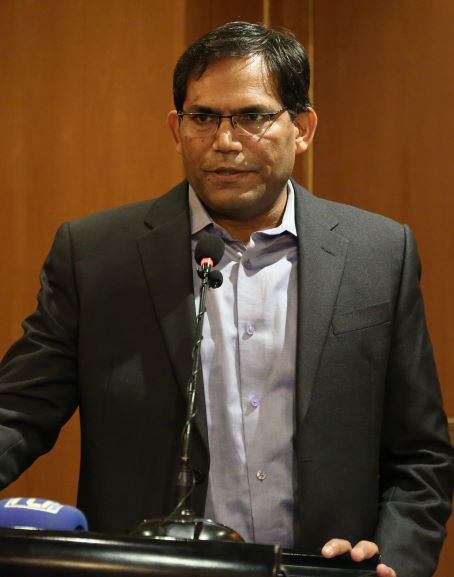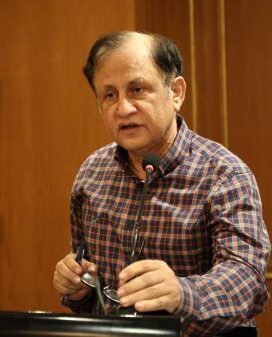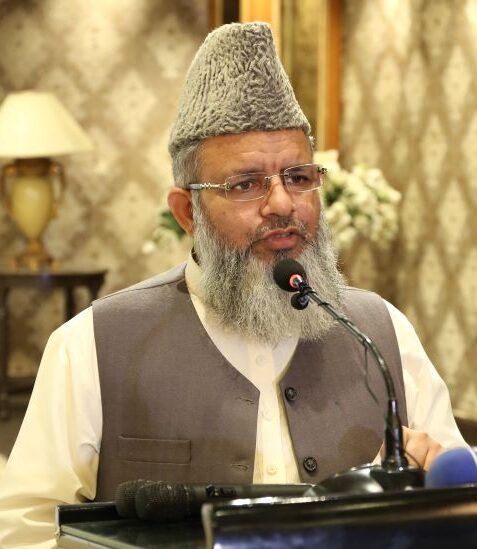“Interfaith Relations in Pakistan; Perspectives and Worldview of Youth in Punjab”
The policymakers, politicians, religious scholars, academicians, students and representatives of civil society attended the event. The report offers a set of recommendations for improving the overall state of Pakistani youth. It recommends that critical thinking and reasoning may be included in the curriculum at school level as both elements are missing among the majority of youth.
PIPS conceived the idea of targeted training and education of the youth around the theme of social peace and harmony. Therefore, as many as nine training and educational workshops, pre- and post-event surveys, and detailed interviews of the select participants were conducted in some major cities of Punjab to elicit their viewpoints on various matters relating to the themes.
Around 250 students from dozens of universities and different districts of the province were engaged in these sessions that were primarily designed for interactive discourse between the experts and the youth on a range of diverse yet interrelated issues.
 At the outset of the launch event, Program Manager PIPS Ahmed Ali shed light on the key findings of the research study. The educational curriculum at all levels may be purged of contents that promote ill-will towards any religious belief, one of the findings say. The concept of shared identity and citizenship should be introduced in the syllabus at high school levels to inculcate acceptance for cultural diversity among students, according to another recommendation.
At the outset of the launch event, Program Manager PIPS Ahmed Ali shed light on the key findings of the research study. The educational curriculum at all levels may be purged of contents that promote ill-will towards any religious belief, one of the findings say. The concept of shared identity and citizenship should be introduced in the syllabus at high school levels to inculcate acceptance for cultural diversity among students, according to another recommendation.“The Pakistani youth may be sensitized about the adverse impacts of religious extremism and terrorism on the country’s economy as well as their individual lives,” said Ali while quoting the report. He said that promoting critical thinking among youth at school level was necessary for their onward survival in the job market. He also highlighted that students should be taught about the basic provisions of the constitution.
Director PIPS Muhammad Amir Rana, who moderated the session, in his introductory remarks said that the report identified the problems and challenges common among the educated youth in Punjab and offered potential explanations on these. He said that the report provided a glance into the Pakistani youth’s thinking and experiences as to how they looked at themselves and their fellow citizens. He said that they would have to see the nature of social changes that have come in the Gulf as well in Pakistan— a process that would help them channelize the youth’s energies to ensure that they were positively contributing to the country’s development.
 Senior Journalist Ashraf Sharif said that different thoughts in society needed to be institutionalized. He argued that there was some space available within political parties to promote those who have inclinations towards politics but these are not creating opportunities for the common youth. “We have to create opportunities for the youth.” He said that they would have to put in place all suggestions related to providing a better path to youth at all relevant platforms including those which are involved in policy making.
Senior Journalist Ashraf Sharif said that different thoughts in society needed to be institutionalized. He argued that there was some space available within political parties to promote those who have inclinations towards politics but these are not creating opportunities for the common youth. “We have to create opportunities for the youth.” He said that they would have to put in place all suggestions related to providing a better path to youth at all relevant platforms including those which are involved in policy making.Tahir Mehdi, a researcher associated with Lok Sujag, Lahore said that discourse on interfaith relations was totally missing. He said that different people take the interfaith relations in a different manner, some talk about forced conversions and others about forceful occupations of religious places of minorities. But the important missing issue is the caste-based system still prevalent in the country and minorities are the worst victims of it, he added. He explained that the majority treats the Christian community by labelling them as “impure” and these experiences shape up the relations of individuals with the society.
 Special Representative to the Prime Minister on Religious Harmony Hafiz Tahir Mahmood Ashrafi, the chief guest of the ceremony, said that the government has tried its best to include subjects of tolerance and exclude hatred material against any sect or any religion at least in school-level curriculum nationwide, especially in Punjab. “But we have to make a difference between beliefs and hatred.”
Special Representative to the Prime Minister on Religious Harmony Hafiz Tahir Mahmood Ashrafi, the chief guest of the ceremony, said that the government has tried its best to include subjects of tolerance and exclude hatred material against any sect or any religion at least in school-level curriculum nationwide, especially in Punjab. “But we have to make a difference between beliefs and hatred.”He said that law was equal for all and the issue was created when someone interferes into the personal liberties of others. He said that the consensus-based document of “Paigham-e-Pakistan” was key to ending sectarian violence in the country. He urged the need to change the bahaviours and added that they would have to promote the strength of dialogue. He suggested that the constitution was for people of all faiths living in Pakistan and all should implement it. He said that some people wanted to create unrest in the society using social media and warned that responsible citizens should have to avoid misusing such platforms. “We would have to sit together to resolve our issues and should look at our weaknesses and strengths.”
Executive Director of Center for Social Justice Peter Jacob suggested that they would have to introduce some safeguards to stop misuse of blasphemy laws as 90 per cent of total 300 accused facing blasphemy charges in Punjab are Muslims.
 Jacob appreciated that the report saying this focused on interfaith relations, which have links with social relations. He talked about ending inequalities in the society before initiating a dialogue adding that both are interlinked. “Extremism has become a self-generating process,” he said, adding that they would have to know about the reasons for extremism. He advised the people to learn to tolerate one another.
Jacob appreciated that the report saying this focused on interfaith relations, which have links with social relations. He talked about ending inequalities in the society before initiating a dialogue adding that both are interlinked. “Extremism has become a self-generating process,” he said, adding that they would have to know about the reasons for extremism. He advised the people to learn to tolerate one another.Iqbal Haider Butt of the Bargad Organization, Lahore said that the youth could not be taken as a single entity as they tend to have different behaviours and thoughts. He said that youth’s identity as a citizen with the state was unclear so far because their religious identity was strong. “We have to be clear what our identity as a citizen is?” He said that the youth should look at their different identities and they should be allowed to speak and provided platforms to move forward.
 Butt argued that it was interesting that youth was aspirational with regard to social and economic empowerment. But few students of few urban universities can plan for start-ups, he added.
Butt argued that it was interesting that youth was aspirational with regard to social and economic empowerment. But few students of few urban universities can plan for start-ups, he added.Scholar and researcher Dr Muhammad Feyyaz called for respecting every body’s opinion but underscored that people of Pakistan, in the time and space, have frozen themselves into the Two Nation Theory. He said that they would have to accept that the people’s identity in Pakistan first comes from religion and then from the country. “There is no confusion among people about identity,” he argued while refuting the claim of other speakers that there was confusion about identity prevailing in the minds of youth and Pakistanis. Talking about interfaith relations, he said that they should create a sense of accommodation within people that co-existence was a reality.
 Dr Feyyaz focused on the point that Pakistanis were a divided nation and were gradually dividing into ethnicities. He talked about ethnocentrism and said that there was now convergence within militant Baloch and deprived Baloch. “This is ethnocentrism that militant and non-militant Baloch are on the same page.” He went on to say that there was a major shift in Pakistan with regard to ethnicities, and added that it has transformed from ethno-nationalism to new ethno-nationalism – a phenomenon in which militant groups of different ethnicities have joined their hands together. In other words, many ethnicities have come together due to their common concerns, he also said.
Dr Feyyaz focused on the point that Pakistanis were a divided nation and were gradually dividing into ethnicities. He talked about ethnocentrism and said that there was now convergence within militant Baloch and deprived Baloch. “This is ethnocentrism that militant and non-militant Baloch are on the same page.” He went on to say that there was a major shift in Pakistan with regard to ethnicities, and added that it has transformed from ethno-nationalism to new ethno-nationalism – a phenomenon in which militant groups of different ethnicities have joined their hands together. In other words, many ethnicities have come together due to their common concerns, he also said.Maulana Ragheb Naeemi, religious scholar and Principal Jamia Naeemia Lahore, in his concluding remarks said that they all needed to think whether the religion has succeeded in resolving problems of the human beings. Certainly, some people would say it has failed and vice versa, he added. He emphasized that they should keep in mind that anyone cannot be prohibited if he wanted to find a solution to his problems within religion.
He said that the youth is confident enough to do many things in this age of artificial intelligence and with the help of modern gadgets but they might be missing practicality, which is the major element in getting clarity on different issues. “Practicality is beyond ambitions and human thoughts and anyone cannot find ways without it.” He said that youth should come out of their dream world and face reality. He referred to the situation in Punjab University, the biggest educational institution of the province, and said that ethnic groups were on the increase there.
![]()
 Naeemi remarked that religion couldn’t be detached from anybody’s life. He said that they would have to think as to what extent the state can enforce the religion, and should have powers to restrict it. “We understand that all faiths within a state should live with peaceful coexistence.”
Naeemi remarked that religion couldn’t be detached from anybody’s life. He said that they would have to think as to what extent the state can enforce the religion, and should have powers to restrict it. “We understand that all faiths within a state should live with peaceful coexistence.”
Javed Aftab, an activist and politician belonging to a left wing party, in his short remarks from the audience said that the religion should be disconnected from the state and they should avoid using the word “minority.”
Director PIPS Amir Rana concluded the event by underlining that there was urgent necessity to include basic concepts of anthropology and sociology in the religious system of education (system of seminaries) and formal education system (both public and private sector education system) of the country. He said that constitution literacy was also essential. He argued for abolishing the quota system in the country saying there was no space for such an arrangement when the constitution gives freedom of speech, movement and business. “Interaction, dialogue and socialization are the beauty of society.”

